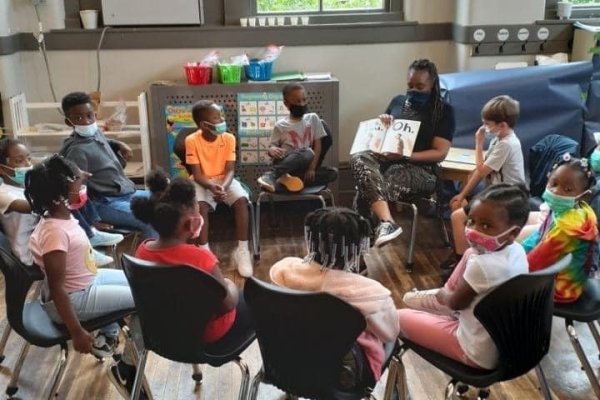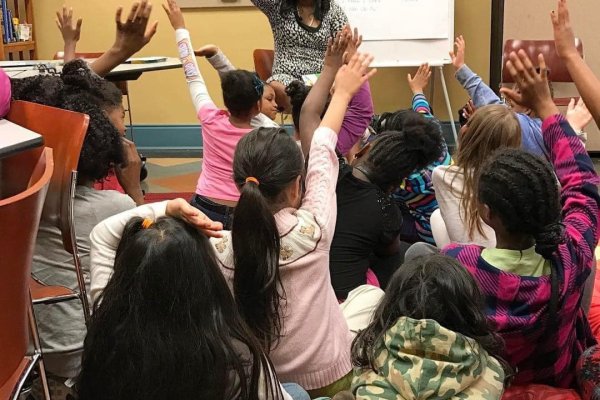East Nashville Hope Exchange Literacy Program
NLD ID #108715
Contact Information
Nashville, TN 37206
Program Overview
The mission of ENHE is to strengthen literacy of at-risk children in East Nashville and beyond and thereby assist in closing the educational "achievement gap" between children from poorer vs. more affluent families. This is achieved through the following programs:
• A tuition-free, six-week summer program (M-F 8am-3pm) with intensive literacy instruction
• After-school tutoring services offered twice a week during the school year
• Monthly family workshops throughout the school year with literacy instruction for students and
family classes on literacy strategies and tools to further reading development at home, in addition
to social and emotional topics
During the ENHE summer program, children develop reading skills under the supervision of certified teachers in a supportive, structured, and safe environment. Additional development occurs through 1:1 encounters with adult volunteer "reading buddies" and home activities involving child and parent/caregiver. Each day of ENHE programming, students are given a book to take home and keep, building their home libraries. Students receive 30 to 40 books each year from ENHE. Annually, we have over 40 guest readers participate in the program. Past guest readers include entrepreneurs in the community, Mayor Karl Dean, NewsChannel 5 meteorologist Lelan Statom, Nashville Predators Players, Tennessee Titans Cheerleaders and T-Rac, doctors, attorneys, principals, journalists, the Mounted Police, chief of the fire department and many more.
During the school year, ENHE engages the family in the following reading activities:
• Workshops
• Literature projects
• Instructional training
• Tutoring instruction in small groups or one-on-one twice a week
• Helping them support their children in school
We benefit the family by developing a reading culture at home, follow-up phone calls, and home/school visits. The child benefits by bridging the achievement gap -- first by helping them learn to read, and then reading to learn.
ENHE is one of the few programs that serve rising K students, administer pre- and post-assessments to measure growth, and operate a family engagement program to keep families involved. We also provide consistent family support and progress monitoring throughout the school year.


Student and Volunteer Success Stories
What We Achieve: At the beginning of the summer, one of our Ross students expressed to us that he could not learn. His confidence was very low. Throughout the program, he would express that he wanted to give up so many times. With the inspiration of his teachers and the positive class community that we had, and the support of his parents, he was never given up on. The reward for his persistence was that he gained 11 reading levels, 9 new phonic sounds, and 27 sight words. I would like to think that ENHE played a big part in that. Teaching the Individual Student: One of our Ross students, who is six, returned for his second summer to Hope Exchange. He receives Special Education and speech therapy services through the public school system during the school year. He has an extremely supportive family who work with him on a daily basis. He was very quiet and shy at the beginning of the program. During the first week he was reluctant to volunteer information and would only repeat answers produced by his peers. As the weeks progressed, he became a far more confident and eager learner. He was willing to volunteer information, answer questions and eager to practice new skills. He responded exceptionally well to the phonics program and made steady gains in his awareness of phonics and the application of those skills. We discovered that when he was placed in an "assessment situation" for sight words, he would shut down. However, when assessed informally on sight words, he was quick to identify multiple sight words. We were able to gain a far more accurate score on his mastered skills through the differentiated assessments. In addition, we worked with him on improving his ability to tolerate more formal testing procedures. This student blossomed into a lively, engaging youngster with a delightful sense of humor. He is extremely proud of his newly acquired phonics and reading skills. Impacting the Family: We work with one Hispanic family that currently has three children enrolled in our program and speaks only Spanish in the home. Because English is a Second Language, these children start kindergarten behind their peers and each year have increasing difficulty progressing towards grade-level proficiency in reading and language arts. The oldest two children made great progress with us in 2014-2016. Without summer instruction, research shows these children will fall 2-3 months behind over the summer. Instead, one child gained one level in reading and another gained three levels. With the expansion of our program to rising Kindergarten students, we were happy to help bridge the gap sooner with their youngest two children! Building Relationship: During the first week, we noticed that one of our returning students wanted a lot of attention. He would do things just to make us mad and get onto him. He once said that he was doing this so he could get kicked out and stay at home with his brother. After we told him he's stuck with us, things started to look up. In one day, he went from tantrums every day, kicking, hitting, flipping things over to no problems. On the afternoon of the final day, many of his behaviors returned. When he was asked why he was acting that way he stated that he did not want it to be the last day. He went from disliking his teacher and the program to loving us and not wanting the program to end. Overcoming Challenges: An assistant teacher was most touched by a student who presented disruptive and sometimes aggressive behavior. We learned that his mother had been arrested and was in jail for a period at the start of the program. Knowing that this instability was happening in his home life we worked hard to provide consistent care and structure for him when he was with us. The implementation of our positive behavior system was a helpful tool in keeping him engaged in learning activities as much as possible. Because he was staying with various different family members, communication with family was a challenge. Despite the challenges he faced, this student continued to attend Hope Exchange and even demonstrated growth in all measured areas. He learned 29 new sight words, improved his reading fluency, was able to identify 17 new sounds and his reading level went up one level. I find hope in the fact that with our support, this student improved his reading during our time together.
Education services
- Find a family literacy program
- Help my child learn
Instruction Type
- In-person
